As pet owners, we want to give our dogs the best possible nutrition to keep them healthy and happy. We often wonder whether our furry friends can eat human foods, and cauliflower is no exception. Cauliflower is a popular and versatile vegetable that is low in calories, high in fiber, and packed with vitamins and minerals. But can dogs eat cauliflower? The answer is yes, dogs can eat cauliflower in moderation, but there are some important things to keep in mind.
Can Dogs Eat Raw Cauliflower?
In general, you can give your dog cauliflower, but first make sure that he tolerates it well by feeding him a small piece to try it out. If you follow the following rules, your dog will enjoy eating cauliflower:
- Give your dog cauliflower no more than two to three times a week.
- No more than two sprouts.
- Feed cabbage only when it is cooked or steamed.
Is Cauliflower Good for Dogs
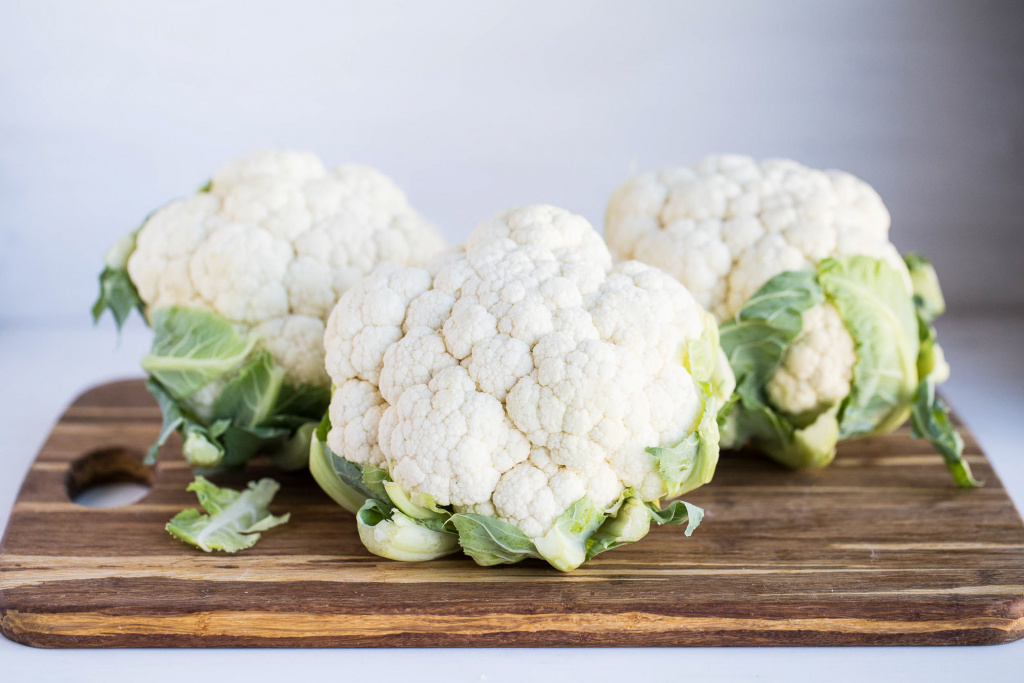
This variety of cabbage is rich in fiber, calcium, folic acid, potassium, and other minerals. The vitamin set includes vitamins C and K.
Can Dogs Eat Cauliflower Leaves
Although dogs cannot be poisoned by any part of the cauliflower plant, the stems can be tough for dogs to chew and can result in choking.
Yet, the leaves are not harmful and many animals find them to be extremely appetizing. This plant’s green portion is a fantastic source of vitamins and minerals.
How to Serve Cauliflower to Your Dog
Before serving cauliflower to your dog, it is important to prepare it properly. Here are some tips on how to serve cauliflower to your furry friend:
- Cooked cauliflower: Raw cauliflower can be difficult for dogs to digest, so it is recommended to cook it before serving. Boiling or steaming cauliflower is the best way to cook it for dogs.
- No seasoning: Do not add any seasonings, oils, or salt to the cauliflower when cooking it for your dog. Seasonings can upset your dog’s stomach or cause health issues.
- Small portions: Moderation is key when it comes to feeding your dog cauliflower. Small portions of cooked cauliflower can be added to your dog’s regular food as a healthy treat or snack.
Feed in small amounts. As we wrote above, not more than once every 7 days. Overeating can cause the side effects mentioned earlier.
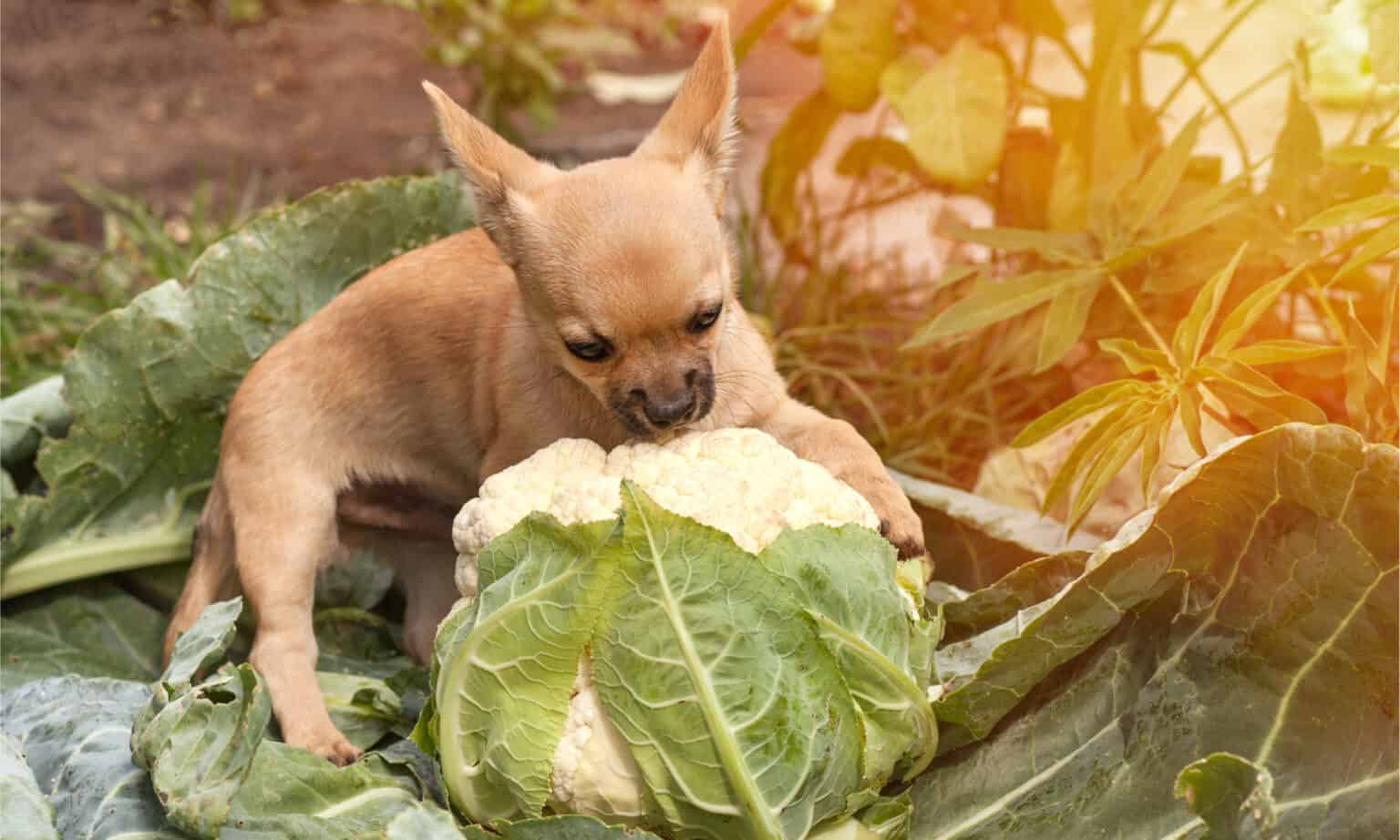
How Much Cauliflower Can Dogs Eat?
A small dog may only need one or two pieces of cauliflower a day (equivalent to what you might give a very young child). Larger dogs can eat 4-5 pieces of cauliflower a day (comparable to the amount for a 10-year-old child).
Risks and Precautions of Feeding Your Dog Cauliflower
While cauliflower is safe for dogs to eat in moderation, there are some risks and precautions to keep in mind:
- Upset stomach: Eating too much cauliflower can cause digestive issues such as gas, bloating, and diarrhea. Introduce cauliflower gradually and in small amounts to avoid upsetting your dog’s stomach.
- Choking hazard: Raw cauliflower can be a choking hazard for dogs, especially small breeds or dogs with dental issues. Always cut the cauliflower into small pieces and cook it before serving.
- Allergies: Some dogs may have allergies or sensitivities to cauliflower. Watch for signs of an allergic reaction such as itching, swelling, or vomiting, and consult with your veterinarian if you suspect an allergy.

What Else Is There To Add to the Diet?
Cauliflower pairs well with its relatives, Brussels sprouts and broccoli. It can also be combined with cucumbers and young corn. Note that all these vegetables are safe for pets. However, add them in moderation to the main dishes. especially if your pet isn’t used to eating this type of food.
What Shouldn’t Dogs Be Fed?
Naturally, the first thing to do is to give up hot peppers, onions, and garlic. It is also undesirable to include mushrooms in your diet, especially non-store mushrooms. Berries such as grapes (raisins) and currants can cause an allergic reaction.
What Vegetables Can Dogs Eat Daily?
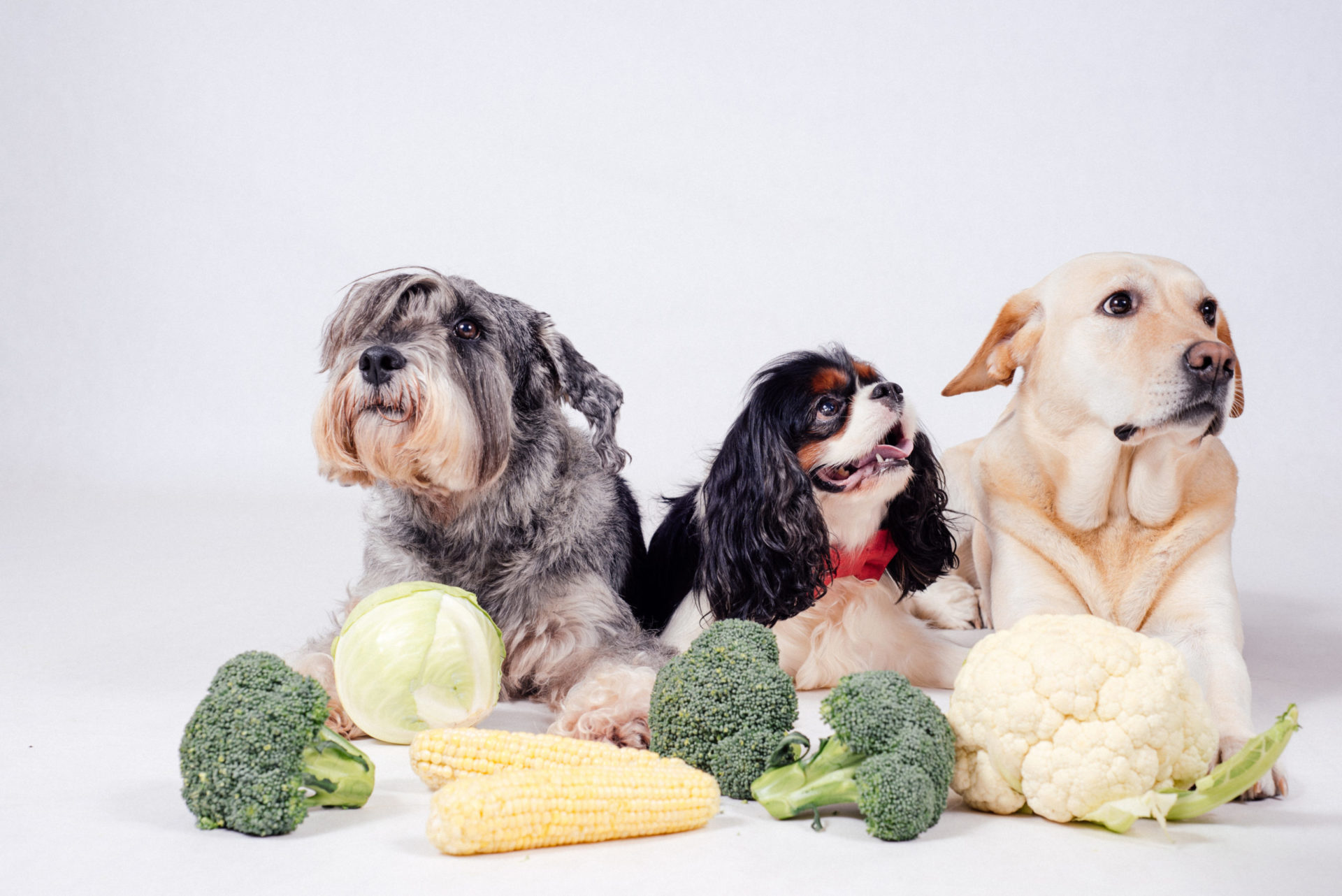
- Kale. It has a positive effect on bone health. Improves overall metabolism and increases immunity. Contains vitamins A and K. Micronutrients such as iron and calcium.
- Spinach. It contains the vitamin groups B6, B9 and E. Plus magnesium and potassium.
- Green string beans.
- Cucumbers.
- Celery.
Conclusion
In conclusion, dogs can eat cauliflower in moderation as part of a healthy and balanced diet. Cauliflower is a low-calorie, high-fiber vegetable that is packed with vitamins, minerals, and antioxidants. However, it is important to prepare and serve cauliflower properly, in small amounts and without seasoning or salt. Watch for signs of digestive issues or allergies and consult with your veterinarian if you have any concerns. By following these precautions, you can safely include cauliflower in your dog’s diet and provide them with the nutritional benefits it offers.
FAQ
Renowned veterinarian Avi Blake considers this vegetable to be the best choice in plant foods. Zucchini is easily digested and absorbed by the animal’s body. Plus, it contains many healthy and nutritious substances.
Yes, carrots are not only safe, they are essential for your pet’s body! It makes a great addition to the list of foods your pet eats. Moreover, it can be added to the diet every day. Of the pluses, note: a small number of calories and a lot of useful elements. In addition, the root vegetable is quite tasty and pleasantly crunchy. Therefore, carrots are ideal as a treat.
This plant will not harm your pet. In addition – it is also rich in a variety of vitamins and minerals. It is desirable to give it in a ready-made form, because its structure contains a lot of fiber.
Cauliflower can be given to your dogs as an ingredient in a home-cooked meal, as a pureed treat, or as a finely chopped addition to their regular dog food.
Yes, no problem. Cauliflower and broccoli are perfectly safe for dogs in moderation. They can be served raw or boiled. It is advisable to chop everything in small pieces before feeding.
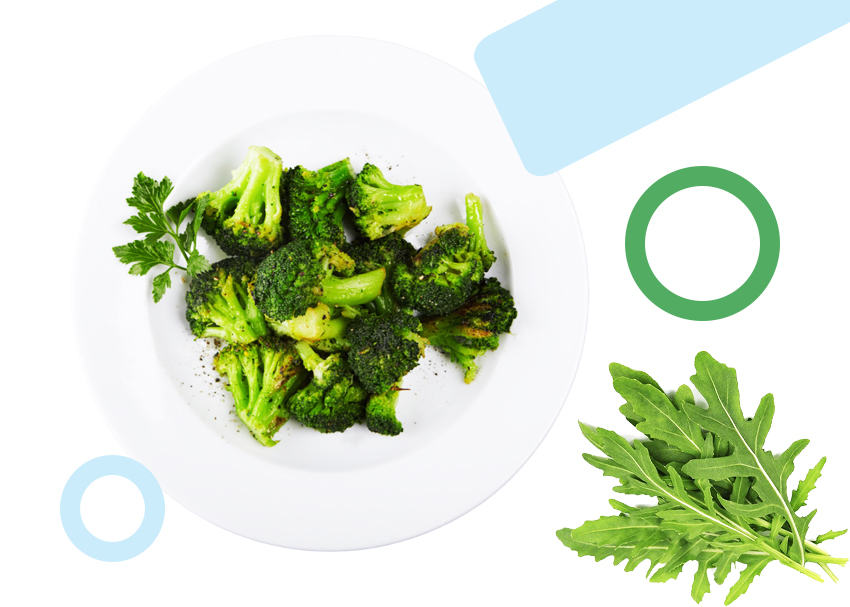
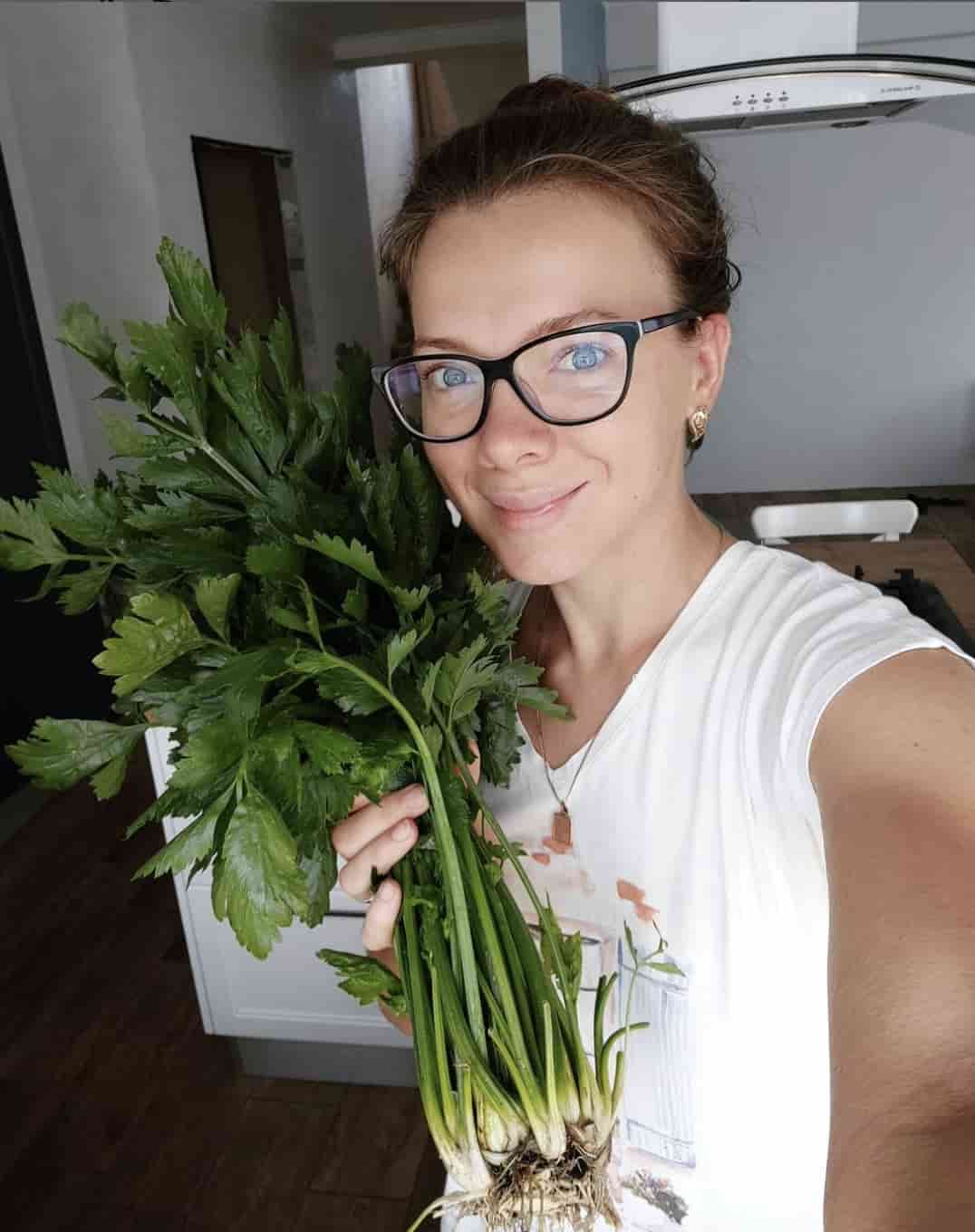




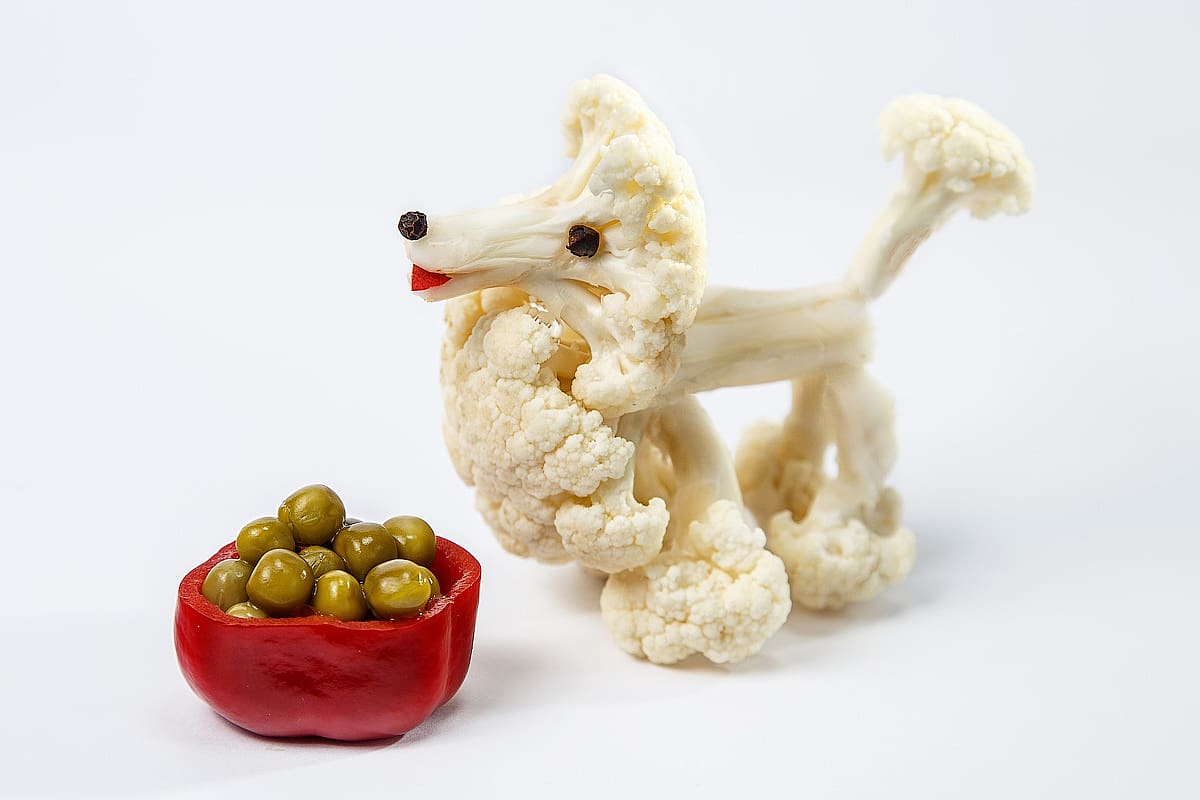

Olivia Miller’s article on whether dogs can eat cauliflower was a well-structured and informative piece. As a dog owner, I always strive to provide a balanced and nutritious diet for my pet. The article explored the potential benefits of cauliflower, such as its high fiber content and vitamins, while also highlighting the risks associated with overconsumption. I particularly appreciated how the author included tips on introducing cauliflower gradually and monitoring any adverse reactions. The article was easy to follow, and Miller’s writing style made it engaging. I highly recommend this article to fellow dog owners seeking reliable information on dog nutrition.
Olivia Miller’s article on dogs and cauliflower was an excellent resource for dog owners like me. The author’s advice was clear, practical, and backed by research. I was pleased to see the article address common concerns, such as the potential for digestive issues or allergies in dogs. Miller’s emphasis on cooking methods, like steaming or boiling, to ensure the cauliflower is safe for dogs was especially helpful. The inclusion of alternatives to cauliflower for dogs with specific dietary needs was a thoughtful addition. I’m grateful to Olivia Miller for providing such valuable information that I can apply to my dog’s diet.
I had always wondered whether cauliflower was safe for dogs, and Olivia Miller’s article was exactly what I needed. The author presented a balanced view, discussing both the benefits and potential risks associated with feeding cauliflower to dogs. Miller’s explanations were clear and supported by scientific evidence. What I found most useful were the guidelines on portion sizes and preparation methods. I appreciate how the article emphasized the importance of moderation and consulting a veterinarian before making any dietary changes. This article has given me the confidence to introduce cauliflower to my dog’s diet sensibly. Thank you, Olivia Miller, for addressing my concerns!
Olivia Miller’s article on dogs and cauliflower was an eye-opener! I had never considered giving cauliflower to my dog before stumbling upon this piece. The article provided a thorough analysis of the nutritional value of cauliflower and its potential effects on a dog’s health. Miller also shared practical tips on preparing and serving cauliflower to dogs. I found the article to be highly informative, well-structured, and easy to understand. It’s a must-read for all dog owners who want to explore healthy and safe food options for their furry friends. Thank you, Olivia Miller, for shedding light on this topic!
Olivia Miller’s article on “Can Dogs Eat Cauliflower” was a fantastic read! As a dog owner, I’ve always been cautious about what human foods are safe for my furry companion. This article provided me with clear and concise information about whether cauliflower is suitable for dogs. The author’s research was evident, and the article addressed all my concerns. I appreciate how Miller discussed the potential benefits and risks associated with feeding cauliflower to dogs. Thanks to this article, I now feel confident in incorporating cauliflower into my dog’s diet in moderation. Kudos to Olivia Miller for an informative and well-researched piece!